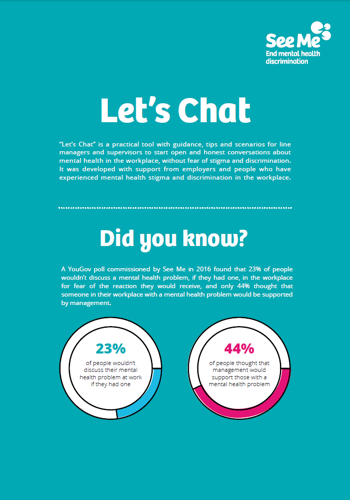
Fundamental Characteristics for Mental Health Inclusion
There are common fundamental characteristics that need to be in place to end structural and direct stigma and discrimination in health and social care. Find out about them here.
Tackling mental health stigma and discrimination is foundational to ensuring that people who experience mental health problems can have a journey of recovery and live fulfilled lives.
If stigma and discrimination exists in the mental health care system, then people will never be able to get the help and support they need. But tackling this stigma and discrimination isn't just about changing things at the front end and supporting someone at a moment of crisis, it's making sure that all the structures, policies and practices are set up so that stigma and discrimination can't exist.
Our tools have been designed to ensure that you can make improvements across all the fundamental characteristics necessary to achieve mental health inclusion.
- Committed leadership
- Inclusive culture and ethos
- Inclusive policies and practices
- Workforce development
- Communication and signposting of support available
- Workforce wellbeing
- Personalised and compassionate care
- Peer support
- Lived experience at the core of service design and delivery
Committed leadership
To ensure that anti stigma messaging and approaches are embedded into policy and practice, you need committed leaders who are willing to take the work forward and make the changes.
Committed leaders must prioritise mental health inclusion as an aspect of organisational strategy and lead on the development and planning of work to tackle stigma and discrimination.
When commissioning, procuring, quality assuring and making improvements leaders must consider the impact on mental health.

Inclusive culture and ethos
Inclusive cultures are as important for people using health and social care services, as they are for those working in them.
An inclusive ethos must be led by leaders to create environments where people feel safe physically, socially and culturally. These environments must promote trust and respect, as well as protect fairness and equity for people experiencing mental health problems.
Core to this is encouraging a common language to talk openly about mental health and to challenge stigma and discrimination.

Inclusive policies and practices
For sustained change you must have inclusive policies that express commitment and action on mental health.
Policies and practices should be co-produced with people with lived experience and implemented consistently to:
- Encourage safe disclosure
- Promote well being and recovery
- Help to prevent mental health problems through early intervention
- Provide personalised and accessible information, signposting and support.

Workforce development
People have to understand the impact of their behaviour and how it can lead to stigma and discrimination if they are to make a change. To do this employers have to commit to training, education and capacity building to enhance knowledge, understanding and behaviour change relating to mental health.
This can involve:
- Enhancing mental health literacy and responsiveness
- Safeguarding training
- Mental health first aid intervention training
- Suicide intervention training
- Resilience and mindfulness.
Core to all of this development and training has to be the aim of reducing stigma and discrimination.
Complementing this should be specific and early development activity that incorporates lived experience, and directly challenges attitudes and prejudices on mental health, promotes recovery, and focuses on skills development to change how people interact with others experiencing a mental health problem.
Communication and signposting of support available
If people are to get help and support quickly, or give help and support quickly, it's important to have knowledge of the support available.
Health and social care staff need to have the knowledge and confidence to sign post people to the right support available locally and nationally.
When looking at health and social care as a workplace, line managers, and employees need to know what support is available and clear signposting has to be readily available.

Workforce wellbeing
All workplaces, including those providing health and social care must prioritise workforce wellbeing, ensuring that colleagues can care for themselves, access support and support each other.
If employees don't feel able to speak about their feelings, then it's unlikely that the culture is right for people accessing services to get the right help and support.
We have more information on how to achieve this in the workplace section of our website. This includes our Let's Chat Tool designed to support discussions between lines managers and employees. Click on the image below to leave this section and visit our workplace section.
Personalised and compassionate care
People accessing health care can feel judged, dismissed and treated as a label or a diagnosis, rather than as a whole person.
To tackle stigma and discrimination it's vital that we provide personalised compassionate responses. That can involve showing flexibility and responsiveness within and across services to understand and meet the needs of the person. To do this fully it's also important to pay attention to micro cultures where people's ideas and culture are not inline with wider policies and practice.


Peer support
Development of peer to peer or peer-led approaches helps break down stigma related barriers by normalising recovery.
In a wider culture, acknowledging that we all have mental health and any of us could struggle can show that having a mental health problem doesn't make you different.
Moray Wellbeing Hub have created this video to show how they have been working to tackle stigma in health and social care. It has clear tips and pointers based on learning and evidence based approaches that you can lift and use in your area, whether in formal roles or just as humans who want a better community for those they care about.
Lived experience at the core of service design and delivery
Those creating the policies and practices for health and social care must ensure that people with lived experience can be involved, to help shape the decisions that affect them.
Core to this is appreciating that people with lived experience may prioritise different outcomes.
To achieve mental health inclusion there must be accountability in relation to mental health inclusion. This can be done with:
- The use of supportive policy
- Regulatory frameworks and processes
- Scrutiny of quality standards and services
- Quality improvement
- Self- assessment approaches.





